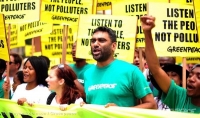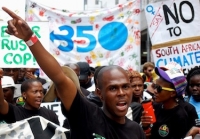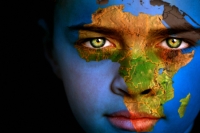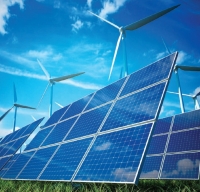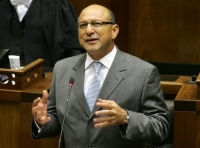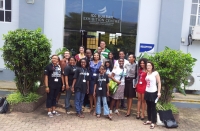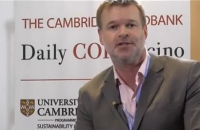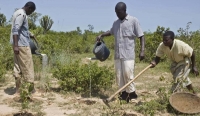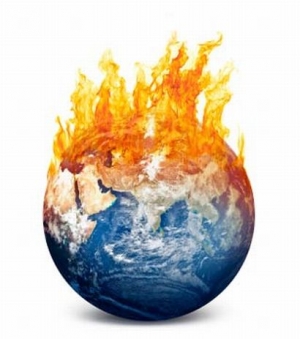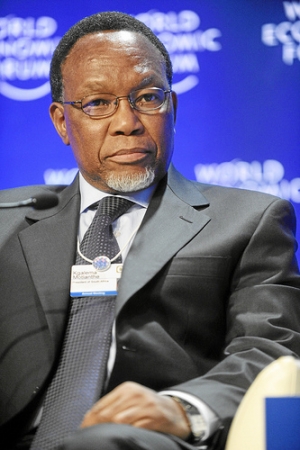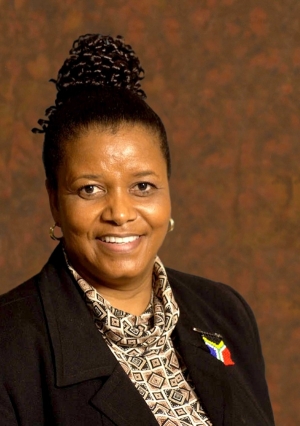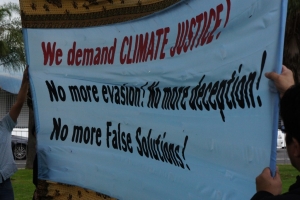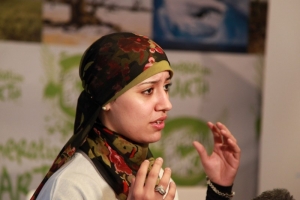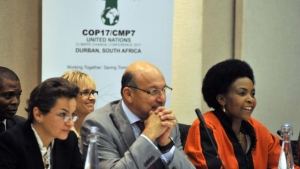As the holidays approach, the giant Asian factories are kicking into high gear to provide us with monstrous piles of cheaply produced goods - merchandise that has been produced at the expense of South African labour. This year will be different. This year South Africans will give the gift of genuine concern for other South Africans.
A wolf in sheep’s clothing, we’ll all agree, is a dangerous beast. Yet, here in the UNFCCC wolves are walking among us on a daily basis, some easier to spot than others. Politicians are meant to be the masters of disguise, and some of their disguise attempts, while feeble, are passing muster. This article aims to reveal the wolf’s teeth and claws underlying the sheepish disguise of carbon capture and storage under the clean development mechanism.
Waiting nine years for climate action isn’t just a delay, it’s a death sentence for communities on the front lines of the climate crisis. Yet that appears to be exactly what the US representatives to Cop17 are pushing: delaying climate change action until 2020.
As the first week of negotiations at the so-called “African COP 17” drew to an end and the final week begins, it is perhaps a poignant time to ask: What could possibly be meant by calling COP 17 “an African” COP?
On Monday the 5th of December MediaClimate held a seminar titled “Media meets climate: A problem or a solution for social movements” at the Centre for Civil Society, University of KwaZulu-Natal, Howard campus.
New street lighting in Durban represents good luminance and uniformity in LED lighting; will create a more livable city with safer roads, increased security and a comfortable outdoor environment.
South Africa and European Union nations earlier this week announced a massive renewable energy initative, and this was launched in Durban on Wednesday. The South African Renewables Initiative (SARi) is in a bid to scale up and secure long-term funding to enable the growth of the renewable energy industry in South Africa.
The largest ever financial vehicle for the distribution of climate justice is soon to be on the negotiating table at COP 17. International delegates at COP 17 are gearing up to discuss the Green Climate Fund, which requests of developed countries to provide developing countries with “scaled up, predictable, new and additional, and adequate funding” to deal with climate change. Its future might, however, be on shaky grounds.
As countries such as the US, Canada, Russia and Japan push to delay agreement to a legally binding framework for climate change to 2020 - a delay which will likely push our ability to reduce climate change to 2 degrees Celsius out of our hands – it is either sadly ironic or apt (I can’t decide) that COP17 commemorated Youth and Future Generations Day today. The focus of many of the commemorations was on the role that youth had to play in the future of climate change negotiations, and how climate change would affect both today’s youth and future generations.
COP17: The Cambridge Programme for Sustainability Leadership (CPSL) is running a series of high-level briefings at their Oasis of Fresh Thinking with people who will be commenting on the negotiations as they unfold and giving a business perspective on the leadership challenges for businesses in the sustainability arena.
South African president Jacob Zuma has declared his intention to have a decision on Agriculture at the UN COP17 climate negotiations in Durban; while the World Bank is promoting so-called “Climate Smart Agriculture” and carbon offsets as the future of African agriculture and climate solutions.
Africa’s first carbon-neutral bank, continued to demonstrate its commitment to water sustainability as a key participant and host of the Water Roundtable side event at the COP 17.
South Africa is generally considered the leader on the African continent, but not always for the right reasons. While it is deliberated that SA is Africa’s economic and industrial powerhouse, it has come with a price – South Africa is by far the worst polluter and GHG (greenhouse gas) emitter on the continent.
The United Nations climate talks have unfortunately been just that for 16 years – just talk and no real action, the most famous of these so far being the failed conference in Copenhagen in 2009. After the deep disappointment of Copenhagen, a South African anti-apartheid activist teasingly noted that the talks had failed because the climate movement didn’t have a song!
South Africa’s Green Economy Accord was launched at the COP17 talks in Durban today. The Accord, one of the most comprehensive social pacts on green jobs in the world, builds a partnership to create 300 000 new jobs by 2020, in economic activities as diverse as energy generation, manufacturing of products that reduce carbon emissions, farming activities to provide feedstock for biofuels, soil and environmental management and eco tourism.
Edna Molewa, Minister of Water and Environmental Affairs, issued the following statement at the UNFCCC COP17 press briefing on Tuesday 29 November.
The United Nations Convention on Climate Change (UNFCCC) 17th Conference of the Parties (COP 17) kicked off in Durban today with one resounding message, “It always seems impossible until it’s done.”
Johannesburg / Nairobi – 23rd November 2011: Concerned youth from across the African continent gathered this week in Johannesburg ahead of the United Nations Framework Convention on Climate Change (UNFCCC), the 17th session of the Conference of the Parties (COP 17) that takes place in Durban, Kwa Zulu Natal from the 28th November.
Against a background of record greenhouse gas emissions in the atmosphere, more frequent and intense extreme weather events, but also growing momentum for action to fight climate change, the UN Climate Change Conference in Durban (28 November to 9 December) kicked
off today.



